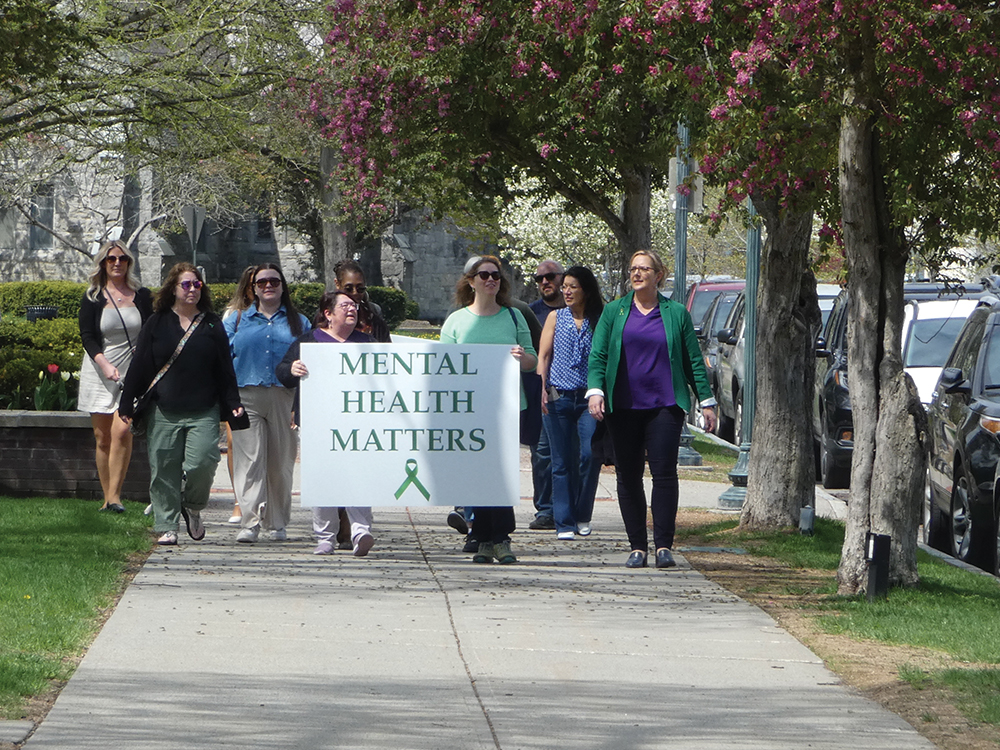
Courtesy ASCEND
By Paul Post
ASCEND Chief Executive Officer Andrea Deepe wants everyone, but business owners especially, to know that help is only a phone call away.
Her non-profit agency is Warren and Washington counties’ main mental health wellness provider with numerous programs and support services available.
Just about every workplace has some degree of stress, but unsettling geopolitical issues, fast-rising prices and mounting financial pressures have contributed to unhealthy levels of anxiety and depression for many people.
“People are having to make some really difficult decisions now more than ever,” Deepe said. “We’re just all trying to keep up and get it done; just trying to show up for work and be there for our families. It’s a lot for a person to take on, especially when there’s no rulebook or guidebook for these types of life scenarios.”
Large companies and small firms alike should be cognizant of such issues and do their best help employees because as Deepe said, “If you don’t have them, you don’t have your business, so you have to invest in them and that includes mind and body. It makes a significant difference when you have top-down leadership who are invested in their employees.”
Simple steps can reduce workplace stress like having a break room to disconnect so people aren’t eating lunch at their desk top; taking breaks to stand up, walk around and do breathing exercises; and having one-on-one interaction with supervisors so people can about their jobs and stressors.
“It’s important for people to understand that we have to take mental health just as seriously as physical health,” Deepe said. “A lot of times it can be difficult because there can be a lot of differences in terms of what people’s needs are.”
“It’s also important for entities to take a look at what services they’re providing to staff,” she said. “For example, an employee assistance program is a resource they can hand over to an employee. They can provide training and support at low cost to an employer while providing a great benefit to employees.”
ASCEND can also provide simple trainings for businesses, answering basic questions such as: What is mental health? What is mental wellness? And how do we do mental wellness or health and mental wellness programs to support our employees?
The Covid pandemic created considerable mental health concerns because of the isolation it fostered while people weren’t able to interact normally in public settings.
“Some people were able to bounce back, but others, for lack of a better word, were really traumatized by that isolation,” Deepe said. “What we’re seeing now is a dichotomy in individuals. Some people aren’t that comfortable in crowds any more. People have really changed the way they integrate into the community.”
The pandemic had a profound impact on business — restaurants, supermarkets and retail stores in particular.
“Some had to shut down or provide other services to survive,” she said. “A lot of people have gone to online shopping because they find it to be more convenient. They don’t have to into a store any more, which is hurting some businesses. Restaurant delivery services boomed so now people don’t have to leave their homes to get a bite to eat. That’s affecting businesses, too.”
Fall from the pandemic is still being felt among some students and young adults whose schooling, at all grade levels, and college careers were impacted.
Many of ASCEND’s connections to the business community come from its engagement in Adirondack Regional Chamber of Commerce activities.
Founded in 1948 as the Glens Falls Mental Hygiene Association, Ascend has evolved over the decades to meet the changing needs of the community. The organization has undergone several name changes, most recently rebranding from the Warren Washington Association for Mental Health to ASCEND Mental Wellness in 2023.
It has a $10.5 million budget, largely from state and federal funding, 130 staff and serves between 1,200 and 1,500 people each year, with hubs in Hudson Falls and Glens Falls.
Several of its main departments are:
Caleo counseling provides outpatient therapy and psychiatric services for children, adolescents, and adults.
“That’s where people can physically walk into our clinic and say, ‘I need help. I need mental health services,’ rather than a traditional intake where you have to call and set up an appointment Here they can just walk right in and we start the process. We’re really trying to promote it more so people undersand there’s places they can go.”
Residential services provides both restorative and supportive housing options for individuals in recovery. ASCEND recently obtained funding for 45 new beds.
“We have a wait list to be filled so we’re looking for landlords with one- or two-bedroom apartments so we can create this space for people,” Deepe said. “We rent the apartment or help an individual rent it and support them in their care while they’re living there.”
Dual Recovery offers support for individuals dealing with both mental health and substance use challenges.
Care Management, which assists individuals in coordinating care and accessing necessary services.
Outreach, which engages with individuals in the community to connect them with appropriate services.
Community Mental Health Training is extremely important because it offers educational programs to raise awareness and reduce stigma.
But for all that ASCEND does, Deepe said there’s still a need for more and improved services to meet the challenge of growing demand.
“Thankfully, though, there are some new types of services out there especially for homebound people, things such as online and tele-health services,” she said. “We can connect with people through a computer, cell phone or even having sessions with a telephone call. Things of that nature were not available before and now they are. It’s more tools in our toolbox to reach more people.”
“Nobody has to walk this line alone,” Deepe said. “Everybody’s got a different recovery journey. We want to be part of that in some way, shape or form.”
